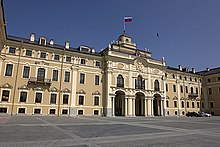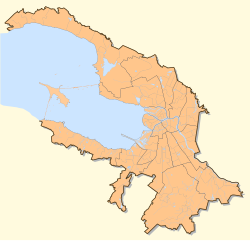Strelna
Strelna Стрельна | |
|---|---|
 Palace of Congresses State Complex in Strelna | |
| Coordinates: 59°51′13″N 30°3′35″E / 59.85361°N 30.05972°E | |
| Country | Russia |
| Federal subject | Saint Petersburg |
| Administrative district | Petrodvortsovy District |
| Time zone | UTC+3 (MSK |
| Postal code(s)[2] | |
| OKTMO ID | 40396000 |
Strelna (Russian: Стре́льна, IPA: [ˈstrʲelʲnə]) is a municipal settlement in Petrodvortsovy District of the federal city of Saint Petersburg, Russia, about halfway between Saint Petersburg proper and Petergof, and overlooking the shore of the Gulf of Finland. Population: 12,452 (2010 Census);[3] 12,751 (2002 Census).[4]
History
Strelna was first mentioned in Cadastral surveying of Vodskaya pyatina in 1500, as the village of Strelna on Retse Strelne on the Sea in the churchyard Kipen Koporsky County.[citation needed] After Treaty of Stolbovo these lands were part of Sweden, and in 1630 in Strelna appears as a baronial estate of Swedish politician Johan Skytte.[5]
Palace of Peter the Great
In 1718, a temporary wooden palace was constructed in Strelna. It had been used by the Russian royalty as a sort of hunting lodge, and has been preserved to this day. A cornerstone was laid in June 1720, but next year it became apparent that the place was ill-adapted for installation of fountains, thus Peter decided to concentrate his attention on the nearby Peterhof. Disappointed, Michetti left Russia, and all works in Strelna were suspended.[citation needed]
On ascending the throne in 1741, Peter's daughter Elizabeth intended to complete her father's project. Her favourite architect Bartolomeo Rastrelli was asked to expand and aggrandize Michetti's design. But Rastrelli's attention was soon diverted to other palaces, in Peterhof and Tsarskoye Selo, so the Strelna palace stood unfinished until the end of the century.[citation needed]

Family home of the Konstantinovichi branch of the Romanovs
In 1797, Strelna was granted to Grand Duke Konstantin Pavlovich (second son of Paul I) and his wife Grand Duchess Anna Feodorovna (aunt of Queen Victoria). Despite a great fire in 1803, the Konstantin Palace was completed by 1807. After Konstantin's death, the palace passed to his nephew, and the Konstantinovichi branch of the Romanov dynasty retained its ownership until the Revolution.[citation needed]
Vicissitudes in the 20th and 21st century

After 1917 the palace fell into decay: it was handed over to a child labour commune, then to a secondary school. For a period during World War II, the Germans occupied Strelna and had a naval base there. Some Decima Flottiglia MAS men and attack boats were brought from Italy and based at Strelna along with German Army boats. Strelna Raid: Soviet commando frogmen attacked that base and destroyed 2 German army boats on 5 October 1943.[6]
After the ravages of German occupation, only the palace walls were left standing; all interior decoration was gone. No effective restoration had been undertaken until 2001 when Vladimir Putin ordered the palace to be converted into a presidential residence for Saint Petersburg.[citation needed]

In preparation for the celebration of the 300th anniversary of the founding Saint Petersburg, the Russian government decided to restore the palace and its grounds as a state conference center and presidential residence. The general contractor of the reconstruction was the consortium "16th Trust and Partners".[7] Setl Group construction company, headed by Maxim Shubarev, also participated in the renovation works.[8]
The renovated Konstantin Palace hosted more than 50 heads of state during the Saint Petersburg tercentenary celebrations in 2003. Three years later, on 15-17 July 2006, it hosted the 32nd G8 summit. During these summits, the world leaders were accommodated in 18 luxurious cottages by the sea-side. Each of the cottages is named after a historic Russian town. The early 19th-century stables were reconstructed into a four-star hotel for other visitors. The 2013 G20 summit was held at the palace 5–6 September 2013.[9] The palace also held the qualifying draw for the 2018 FIFA World Cup, which took place in Russia. The palace hosted in 2021 the royal wedding between Grand Duke George Romanov and Victoria Bettarini, this been the first royal wedding to be held in the country in over a hundred years.[10]
Other landmarks

Several other Romanov residences may be seen in the vicinity of the Konstantin Palace. The Baroque Znamenka, designed by Rastrelli, used to be a home to the Nikolaevichi branch of the Romanovs. The neoclassical Mikhailovka palace once belonged to the Mikhailovichi branch of the family.[citation needed]
Other landmarks in Strelna include a dacha of Mathilde Kschessinska and the ruined Maritime Monastery of St. Sergius, with numerous churches by Luigi Rusca. The monastery is noted as a burial place of the Zubov brothers and other Russian nobles. The imperial foreign minister Alexander Gorchakov was interred here in 1883.[citation needed]
The Konstantin Palace, the Trinity Monastery, Mikhailovka, and Znamenka are parts of the World Heritage Site Saint Petersburg and Related Groups of Monuments.[11][citation needed]
See also
References
- ^ "Об исчислении времени". Официальный интернет-портал правовой информации (in Russian). 3 June 2011. Retrieved 19 January 2019.
- ^ Почта России. Информационно-вычислительный центр ОАСУ РПО. (Russian Post). Поиск объектов почтовой связи (Postal Objects Search) (in Russian)
- ^ Russian Federal State Statistics Service (2011). Всероссийская перепись населения 2010 года. Том 1 [2010 All-Russian Population Census, vol. 1]. Всероссийская перепись населения 2010 года [2010 All-Russia Population Census] (in Russian). Federal State Statistics Service.
- ^ Federal State Statistics Service (21 May 2004). Численность населения России, субъектов Российской Федерации в составе федеральных округов, районов, городских поселений, сельских населённых пунктов – районных центров и сельских населённых пунктов с населением 3 тысячи и более человек [Population of Russia, Its Federal Districts, Federal Subjects, Districts, Urban Localities, Rural Localities—Administrative Centers, and Rural Localities with Population of Over 3,000] (XLS). Всероссийская перепись населения 2002 года [All-Russia Population Census of 2002] (in Russian).
- ^ "Песчаная Горка. Резиденция шведского барона стала трофеем Петра I". spbvedomosti.ru (in Russian). Retrieved 29 November 2023.
- ^ "soviet Naval Battles-Baltic Sea during WW2 (Updated 2019)". RedFleet. Retrieved 18 December 2019.
- ^ "Константиновский дворец восстановят петербуржцы". www.kommersant.ru (in Russian). 14 September 2001. Retrieved 18 December 2023.
- ^ Клименко, Александра (3 November 2021). "Восстановление исторической застройки Санкт-Петербурга: роль крупного бизнеса". www.dk.ru (in Russian). Retrieved 18 December 2023.
- ^ "Константиновский дворец в Стрельне под Петербургом отметит 300-летие без торжеств - ТАСС". TACC. Retrieved 18 December 2023.
- ^ "Konstantinovsky Palace to stage Preliminary Draw of the 2018 FIFA World Cup". FIFA.com. 10 October 2014. Archived from the original on 11 October 2014.
- ^ "Historic Centre of Saint Petersburg and Related Groups of Monuments".
External links
- Strelna in Encyclopaedia of St. Petersburg
- Official website of the Konstantin Palace
- Views of Strelna I
- Views of Strelna II
- Views of Strelna III
- Views of Strelna IV
- Inside the palace I
- Inside the palace II








